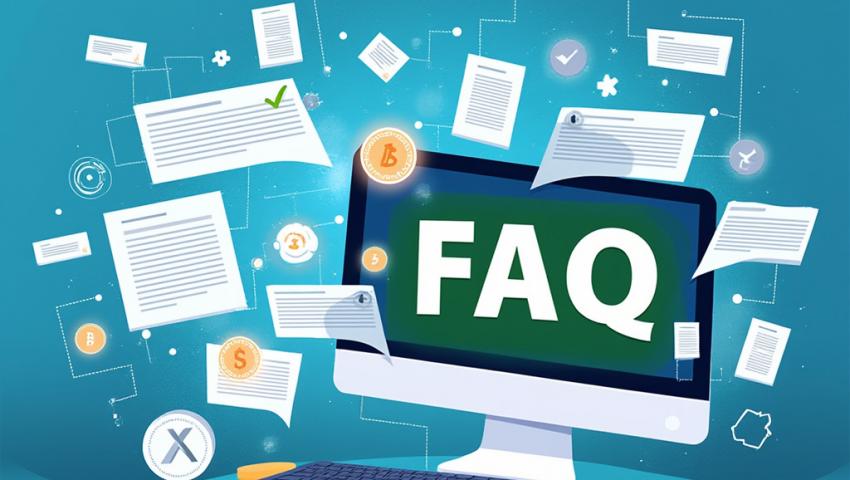
FAQs on Blockchain: Answering Common Questions About Blockchain and Its Applications
Blockchain technology has gained significant attention for its revolutionary impact across industries.
Despite its growing adoption, many people still have questions about its functionality, applications, and potential. In this article, we will answer some of the most common questions regarding blockchain technology and its diverse applications.
1. What is Blockchain?
Blockchain is a decentralized digital ledger technology that records transactions across multiple computers in such a way that the registered transactions cannot be altered retroactively. Each "block" contains a list of transactions, and once a block is completed, it is added to the "chain" in a linear, chronological order. Blockchain ensures transparency, security, and trust without the need for a central authority or intermediary.
2. How Does Blockchain Work?
Blockchain operates through a distributed network of nodes (computers). When a transaction is made, it is verified by participants in the network through consensus mechanisms like Proof of Work (PoW) or Proof of Stake (PoS). Once the transaction is verified, it is recorded in a block and added to the blockchain. This decentralized nature ensures that the data is immutable and secure from tampering.
3. What Are the Main Uses of Blockchain?
Blockchain has a wide range of applications, including but not limited to:
- Cryptocurrency: The most well-known use of blockchain is in cryptocurrencies like Bitcoin and Ethereum.
- Supply Chain Management: Blockchain helps in tracking goods as they move through the supply chain, ensuring transparency and reducing fraud.
- Smart Contracts: Blockchain enables self-executing contracts with the terms of the agreement directly written into code.
- Healthcare: Blockchain can securely store patient records, making them accessible only to authorized individuals.
- Voting Systems: Blockchain can be used to build secure and transparent voting systems, ensuring the integrity of elections.
4. What Are Smart Contracts?
Smart contracts are self-executing contracts where the terms of the agreement are directly written into code. These contracts automatically execute when the predefined conditions are met, eliminating the need for intermediaries. They are widely used in blockchain applications for automating transactions in a secure, transparent, and tamper-proof way.
5. Is Blockchain Secure?
Yes, blockchain is considered highly secure. The decentralized nature of the network, combined with cryptographic techniques, makes it extremely difficult to tamper with the data. Once a block is added to the chain, altering it would require altering all subsequent blocks, which is practically impossible in a large blockchain network.
6. Can Blockchain Be Hacked?
While blockchain itself is secure, it is not immune to potential attacks. Vulnerabilities may arise in areas such as the smart contract code or the platforms used for cryptocurrency exchanges. However, as the technology evolves, these risks are continuously mitigated through enhanced security protocols.
7. What Are the Benefits of Blockchain?
- Decentralization: Blockchain eliminates the need for central authorities, reducing the risks of fraud and manipulation.
- Transparency: All participants in the network have access to the same information, ensuring transparency and accountability.
- Security: Blockchain uses cryptographic techniques that make it highly resistant to hacking.
- Efficiency: By removing intermediaries, blockchain allows for faster and cheaper transactions.
8. What Are the Challenges of Blockchain?
- Scalability: Blockchain networks can face challenges with scalability, especially when handling a high volume of transactions.
- Energy Consumption: Some blockchain networks (like Bitcoin) require significant energy for mining and validating transactions.
- Regulatory Uncertainty: As blockchain technology evolves, governments and regulatory bodies are working to establish frameworks that can address legal concerns.
9. How Can Businesses Benefit from Blockchain?
Businesses can benefit from blockchain in many ways, including improving operational efficiency, reducing costs, enhancing transparency, and creating new revenue streams through innovative blockchain-based solutions. It is especially valuable in industries like finance, healthcare, supply chain management, and legal services.
10. What is the Future of Blockchain?
The future of blockchain is bright, with ongoing advancements in scalability, interoperability, and integration with other technologies like Artificial Intelligence (AI) and the Internet of Things (IoT). Blockchain's potential to revolutionize industries and disrupt traditional business models makes it a key technology for the future.
Explore Blockchain Solutions with Perasoft
If you're interested in leveraging blockchain technology for your business, Perasoft offers a range of blockchain-related services, including blockchain consulting, dApp development, and smart contract development. Our expert team can help you understand and implement blockchain solutions tailored to your needs.

Pera Soft
Leave a comment
Your email address will not be published. Required fields are marked *


